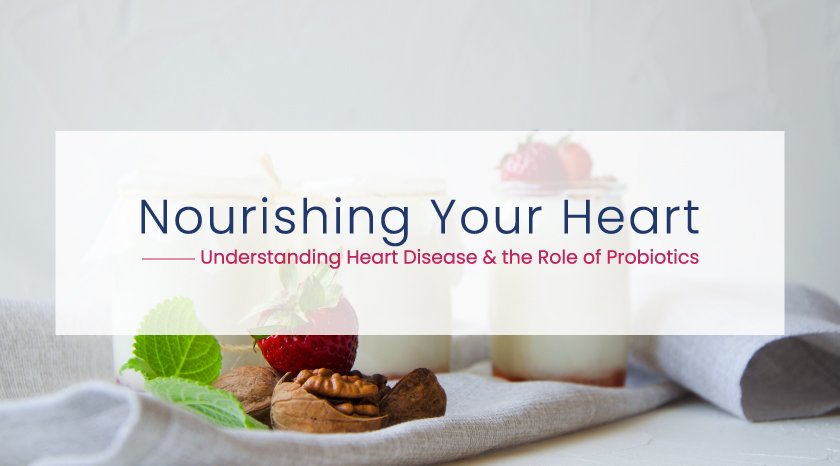Heart disease remains a formidable health concern, standing as the leading cause of death for men worldwide. As men age, concerns about high blood pressure, cholesterol levels, and overall heart health become increasingly prevalent. In recent years, research has shed light on the potential role of probiotics in supporting heart health. In this blog, we’ll explore the impact of heart disease on men, discuss common risk factors, and delve into the emerging evidence surrounding the use of probiotics to promote cardiovascular wellness.
Understanding Heart Disease in Men: Heart disease encompasses a range of conditions affecting the heart and blood vessels, including coronary artery disease, heart attack, and stroke. Men are at higher risk of developing heart disease compared to women, with factors such as age, family history, high blood pressure, high cholesterol, smoking, obesity, and sedentary lifestyle contributing to this increased risk.
- High Blood Pressure (Hypertension): Elevated blood pressure puts strain on the heart and blood vessels, increasing the risk of heart attack, stroke, and other cardiovascular complications.
- High Cholesterol: High levels of LDL cholesterol, often referred to as “bad” cholesterol, can lead to the buildup of plaque in the arteries, narrowing blood flow and increasing the risk of heart disease.
- Poor Diet and Lifestyle Choices: Unhealthy dietary habits, lack of physical activity, smoking, excessive alcohol consumption, and chronic stress can all contribute to the development and progression of heart disease in men.
How Probiotics May Support Heart Health: Probiotics are live microorganisms that confer health benefits when consumed in adequate amounts. While traditionally associated with digestive health, emerging research suggests that probiotics may also play a role in supporting cardiovascular wellness. Here’s how:
- Blood Pressure Regulation: Some strains of probiotics, such as Lactobacillus and Bifidobacterium species, have been shown to modestly lower blood pressure in individuals with hypertension. Probiotics may help produce compounds that promote blood vessel relaxation and regulate blood pressure.
- Cholesterol Management: Certain probiotic strains have demonstrated the ability to modulate cholesterol metabolism, leading to reductions in LDL cholesterol levels and improvements in overall lipid profiles. Probiotics may inhibit cholesterol absorption in the gut and promote its excretion, contributing to cardiovascular health.
- Anti-inflammatory Effects: Chronic inflammation is a key contributor to the development and progression of heart disease. Probiotics may help modulate the immune response and reduce systemic inflammation, thereby protecting against cardiovascular damage.
Incorporating Probiotics into Heart-Healthy Lifestyle: While probiotics show promise in supporting heart health, they are not a standalone solution. A holistic approach to heart disease prevention and management should include:
- Balanced Diet: Emphasize a heart-healthy diet rich in fruits, vegetables, whole grains, lean proteins, and healthy fats while limiting processed foods, saturated fats, and added sugars.
- Regular Exercise: Engage in regular physical activity, including aerobic exercises, strength training, and flexibility exercises, to support heart health, maintain a healthy weight, and reduce cardiovascular risk.
- Stress Management: Practice stress-reducing techniques such as mindfulness, meditation, deep breathing exercises, and hobbies to mitigate the impact of chronic stress on heart health.
- Smoking Cessation: Quit smoking and avoid exposure to secondhand smoke to reduce the risk of heart disease and other smoking-related health complications.
- Moderate Alcohol Consumption: Limit alcohol intake to moderate levels, as excessive drinking can raise blood pressure, increase triglyceride levels, and contribute to heart disease risk.
Heart disease poses a significant health threat to men worldwide, highlighting the importance of proactive prevention and management strategies. While concerns about high blood pressure, cholesterol levels, and heart health loom large, emerging research suggests that probiotics may offer additional support in promoting cardiovascular wellness. By incorporating probiotic-rich foods or supplements into a heart-healthy lifestyle and addressing modifiable risk factors, men can take proactive steps towards nurturing their heart health and enjoying a life of vitality and longevity. As always, consulting with a healthcare provider is recommended before making any significant dietary or lifestyle changes.




